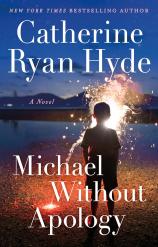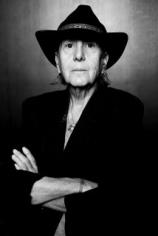Michael Without Apology
Review
Michael Without Apology
Catherine Ryan Hyde is the bestselling author of nearly 50 books, but her latest, MICHAEL WITHOUT APOLOGY, might be her most compelling one. She told me it is a personal favorite and is "special" (I think that is a gross understatement). After we turn the last page, not only have we shared an incredible journey with the protagonist, we have learned and grown along with him. This book will stay with you for a very long time.
In each of her novels, Hyde shares important messages for readers, and this one conveys what I believe is one of the most essential life lessons: that we apologize too often, and usually about things we absolutely shouldn't be apologizing for. While this might sound trite, it's not. This theme goes to the heart of how most of us live our lives.
When he was seven, Michael Woodbine was horribly burned in an accident with firecrackers. His mother and father relinquished him to foster parents. As a result, he carried not only horrific scars on his body, but also psychological scars from thinking that he wasn't worthy of the love of his birth parents when they had kept his older brother.
In sharing Michael's life with us, Hyde plays with timelines as she begins when he is 19 and taking a filmmaking course at college. That's where he meets his teacher, who becomes not only his mentor, but also his friend. We then see Michael at seven interacting with his parents and brother. The sense that something is off is palpable.
Michael has hidden his scars his whole life. His now-adopted mother helps him. He doesn't go to the pool or the beach, and he wears an undershirt "as an added layer of emotional protection." So when he goes to his class and sees Robert Dunning, whose face is horribly disfigured from burn scars, it's an encounter that changes his life. Even their first interaction gives us a hint of what is to come.
Michael arrives early to class --- almost 15 minutes, to be exact. When Mr. Dunning comments on his promptness, Michael apologizes. He responds, "Try not to go through life being sorry." Dunning doesn't apologize for his scars or try to hide them. He addresses them openly with his students, stating that being disfigured isn't a secret or scandalous: "It's not a moral failing on my part. It just is."
"In this brilliant novel, we learn about accepting ourselves and others, with all our scars and imperfections. Hyde demonstrates that we don't need to apologize for our imperfect bodies, or for a messy house. And she walks the walk."
When a student stares at Dunning and then apologizes for doing so, he tells her that she has nothing to be sorry about. He explains that we recoil from injury because of how we are programmed genetically. He invites them to stare and get used to it. When Michael stays after class, Dunning is puzzled. Michael is, to all outward appearances, an extremely handsome young man. Dunning points out that he could be a leading man in the film world. So Michael does something he's never done before. He takes off his shirt and shows his teacher his own scars.
During their subsequent conversation, Dunning tells Michael that to be truly free, he needs to be able to "stand in front of whatever small segment of the world you find yourself facing and say 'Here I am. Get used to it.'"
Michael decides to make his student film about people showing their scarred bodies and not being ashamed. He puts up a notice in the student union for volunteers who will participate: "Need volunteers for a student documentary film. Do you have a lot of worry and stress about your body and your appearance? Call Michael." He cuts 10 strips of paper for people to tear off his phone number. By the time he runs to class to collect his forgotten jacket and returns, all 10 strips are gone.
Michael’s first call is from Rex Aronfeld, a 103-year-old gentleman. He had gone to the 1936 Olympics in Berlin and won a silver medal. He has one regret: he shook Hitler's hand instead of spitting on him. His contribution to Michael's film would be his ancient body. He explains that, although he always had been proud of his body, now it's not a thing of beauty. And he says he shouldn't have to be ashamed of how he looks. He has just lived longer than most people. At that point, Michael decides to change the focus of his project.
When he alerts his teacher to the shift in direction and what he wrote on the poster asking for volunteers, Dunning isn't surprised. He shocks Michael when he tells him that pretty much everybody worries and stresses about their body and appearance. Michael is stunned. The documentary, which he calls Here I Am, is going to be about more than scars.
A woman with a recent double mastectomy is willing to be a volunteer. Madeleine is 30 years old, but there's an attraction between her and Michael. They become close very quickly. And while in novels, often the characters know more than the readers do, in this case we know more about Madeleine than Michael does. It's not that she isn’t open and upfront about this "secret." She tells him about herself in such delicate terms and euphemisms that when he finally realizes what she's been trying to tell him, it's incredibly touching.
When the film goes public, Michael’s birth parents reach out to him. He meets with them at a restaurant to satisfy his own curiosity. At one point, his birth father tells him that he's too sensitive. Michael's response is another one of Hyde's brilliant commentaries on life, which are jewels in her novels. He says, "Whenever I hear anybody tell anybody else they're too sensitive, all I hear is 'I want to feel free to say offensive things to you and it really inconveniences me when you mind.'" After that meeting, Michael is able to realize that his parents letting him be adopted isn't his fault; it's completely a reflection of them and their glaring deficits.
This novel is about the scars that we all have. Some scars are readily apparent to those around us. Others might be on the surface, but concealed under clothes or makeup. And yet, most scars that people carry are truly hidden. We might be scarred as a result of bullying, being attacked, having PTSD, or being different from those around us. We go through life often apologizing for things that either aren't our fault or are totally out of our control. Dunning didn't just teach Michael filmmaking. As he shares in a speech he gives when he thanks his teacher, "You're my rock, and what I learned from you is everything. And not just about film. I learned how to be a person from watching you do it so well."
That's the wonderful thing about reading. While we all can't have our own Robert Dunning to teach us how to be good people, and how to think critically about life, the universe and our place in it, we can turn to books. Books introduce us to people who are different from us, who might have scars we don't have, who have important things to do and say. Books teach us, and they help us relate to others, have empathy for them, and understand how they think and feel.
In this brilliant novel, we learn about accepting ourselves and others, with all our scars and imperfections. Hyde demonstrates that we don't need to apologize for our imperfect bodies, or for a messy house. And she walks the walk. On her website, in the "about me" section, Hyde writes: "I don’t want to be one of those authors who only shares 20-year-old photos of myself because of a misguided idea that I have to look a certain way. I look the way I look." The pictures of her are sans makeup, black and white and shades of gray (like her novels), simply dressed in jeans and a dark jacket with a black hat. She is saying, "Here I am."
Reviewed by Pamela Kramer on May 10, 2025
Michael Without Apology
- Publication Date: May 6, 2025
- Genres: Fiction, Women's Fiction
- Paperback: 277 pages
- Publisher: Lake Union Publishing
- ISBN-10: 1662522290
- ISBN-13: 9781662522291




